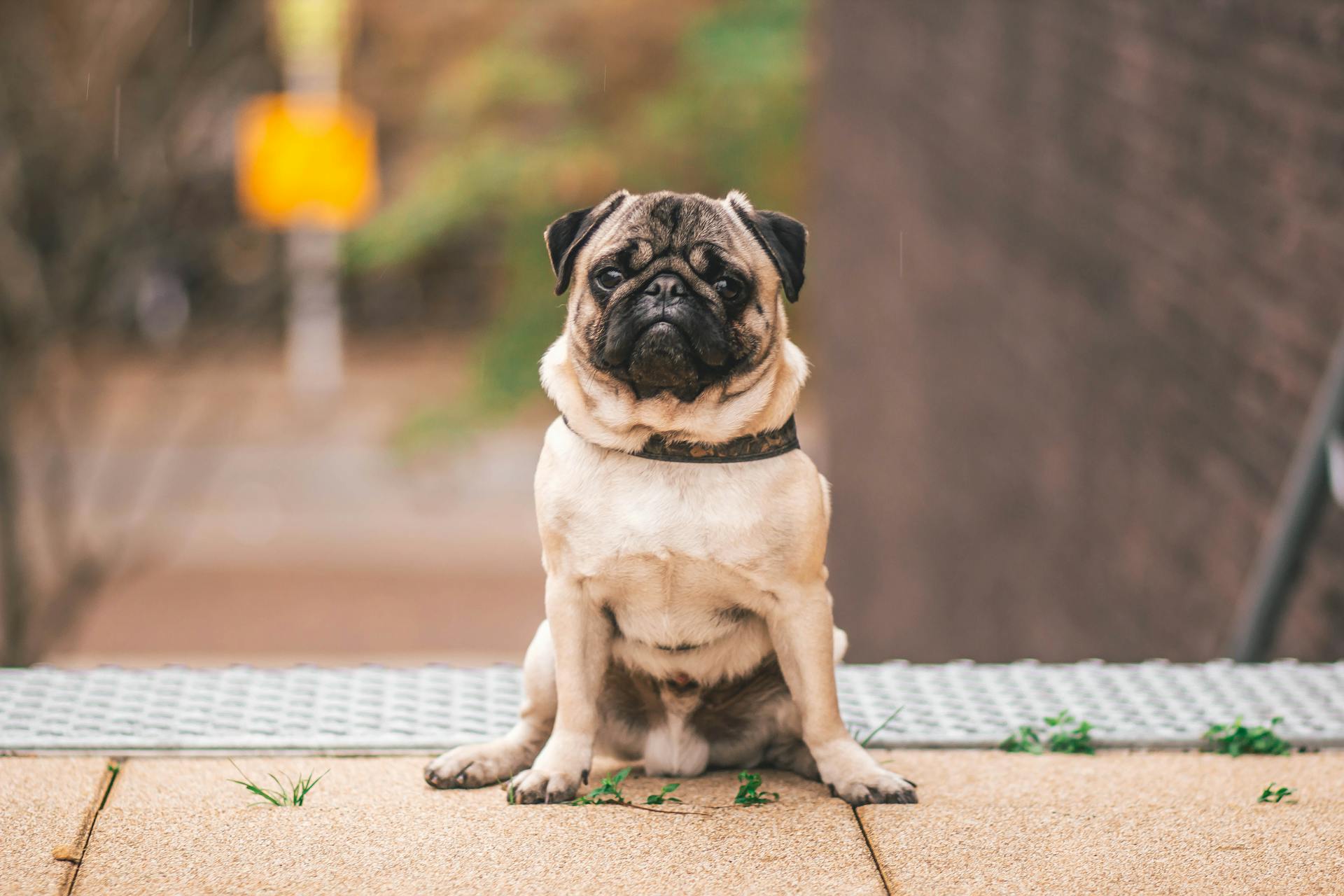
The Pomapoo is a delightful crossbreed that combines the Pomeranian and Poodle, and as such, its lifespan is a topic of interest for many potential owners. On average, a Pomapoo can live for 12-16 years.
Their longevity is influenced by their Poodle heritage, which can live up to 15 years. However, the Pomeranian parent can live up to 12-16 years, making the Pomapoo's lifespan a bit more unpredictable.
Factors such as diet, exercise, and health conditions can also impact a Pomapoo's lifespan. Regular check-ups and a balanced lifestyle can help ensure your Pomapoo lives a long and healthy life.
A different take: Lifespan of a Miniature Poodle
Living Needs
Pomapoo's are adaptable to small living spaces, thriving in apartments or tiny homes. They'd also do well in larger houses with acreage, but would likely spend most of their time indoors.
These extroverted family dogs get along well with other pets, including cats, and have a relatively low exercise need. A daily walk or 30 minutes of exercise a day should suffice.
Exercise
Pomapoos are highly active dogs that need plenty of physical exercise, but they don't require marathon sessions. A daily walk of about 30 minutes should suffice.
They're happy to get their exercise just about anywhere, and their small size means they can zip around the house chasing balls, toys, and their owners.
Pomapoos do well with regular walks and multiple interactive play sessions with their owners, but they don't need much exercise overall.
A daily dose of about 30 to 45 minutes of highly active outdoor exercise is more than enough for these little pups.
To keep their minds active and engaged, Pomapoos need a variety of toys, puzzle feeders, and playthings in the house.
Nutrition
These dogs require a small breed-specific dog food formula to meet their nutritional needs. They can thrive on a formula designed for either Pomeranians or Toy Poodles.
It's essential to choose a food with kibble size suitable for small breeds, as they lack the jaw strength and mouth space to handle large kibble meant for bigger breeds.
A high-quality dog food with fresh, real, named ingredients is crucial. Look for foods that list a named animal protein as the first ingredient.
Foods that meet the American Association of Feed Control Officials (AAFCO) nutritional guidelines are a safe choice. Avoid foods with fillers, additives, or chemical preservatives.
Small breeds like these need high protein, moderate fat, and higher calorie meals to keep their blood sugar at a healthy level and replenish energy. They should eat three or four times a day.
Health
Pomapoo lifespan is around 12-15 years, which is a relatively long life for a small dog breed. They tend to be healthy dogs, but like all breeds, they can be prone to certain health issues.
Luxating patellas, or dislocated kneecaps, are a common problem in Pomapoos, inherited from their toy poodle and Pomeranian parents. Regular patellar evaluations can help detect this issue early on.
Epilepsy is another condition that can affect Pomapoos, causing seizures that can range in severity. With proper medication and care, they can live full and happy lives.
Cataracts and vision loss are also potential issues as Pomapoos age. Regular eye exams can help detect these problems early on.
Dental problems, such as dental overcrowding and gum diseases, are common in small breeds like the Pomapoo. Regular dental check-ups and cleanings are crucial to prevent these issues.
Here are some common health issues that can affect Pomapoos, along with recommended tests to detect them early:
Regular veterinary care and preventive measures can significantly contribute to a healthy, fulfilling life for your Pomapoo.
Care and Costs
Caring for a Pomapoo requires regular vet check-ups to monitor for inherited health issues like dental problems and joint issues.
Their grooming needs are moderate to high, requiring regular brushing and professional grooming to maintain coat health.
A balanced diet suitable for small dog breeds is recommended, and portion control is essential to prevent obesity.
To give you a better idea of the costs involved, here's a breakdown of the typical expenses:
- Purchase Price: This can be quite expensive if you buy from a reputable breeder.
- Initial Supplies: This includes food, toys, and other essentials.
- Food: A balanced diet suitable for small dog breeds.
- Grooming: Regular brushing and professional grooming are necessary.
- Veterinary Care: Regular check-ups and potential medical expenses.
- Pet Insurance: To cover unexpected medical costs.
- Miscellaneous Supplies: This includes treats, toys, and other miscellaneous expenses.
- Training: Positive reinforcement training methods are recommended.
- Emergency Medical Expense: Unexpected medical costs not covered by insurance.
- Boarding or Pet Sitting: When you're away from home.
- License and Microchip: To ensure your Pomapoo is properly registered and identified.
Caring for a Pomapoo
Caring for a Pomapoo requires attention to their grooming needs, which can be moderate to high. They need regular brushing and professional grooming to maintain their coat health.
Their small size means they can inherit dental problems, such as overcrowding and gum diseases, so regular dental check-ups are crucial. Patellar evaluation is also necessary to check for knee stability.
Pomapoos are intelligent and respond well to positive reinforcement training methods. Early socialization is important to foster confidence and prevent excessive shyness.
A balanced diet suitable for small dog breeds is essential, with portion control being key to prevent obesity. Regular veterinary care and preventive measures can significantly contribute to a healthy, fulfilling life for these charming dogs.
Here are some key health issues to be aware of:
Regular grooming, including brushing and occasional professional grooming, is essential to prevent matting and tangling of their coat.
Pomapoo Care Costs
Pomapoo Care Costs can add up quickly, with estimates ranging from $2,150 to $6,400 per year.
The purchase price of a Pomapoo puppy from a reputable breeder can be quite expensive, ranging from $500 to over $2,500. Always consider adopting from a shelter or rescue.
Pomapoos require regular grooming due to their coat, which can add to the overall cost. Initial supplies, including toys, chews, and wellness supplements, can cost between $100 and $400.
Professional training is essential for a Pomapoo, but can add several hundred dollars to the cost of their care, ranging from $500 to $1,000.
Setting aside funds for unexpected health issues is crucial, as emergency medical expenses can easily reach into the thousands.
Here's a breakdown of estimated annual costs:
- Food: not specified
- Grooming: not specified
- Veterinary Care: varies widely depending on location and other factors
- Pet Insurance: varies depending on coverage and Pomapoo's age and health
- Miscellaneous Supplies: $100 - $400
- Training: $500 - $1,000
- Emergency Medical Expense: can reach into the thousands
- Boarding or Pet Sitting: varies depending on location and length of stay
- License and Microchip: $50 - $100
Total Estimated Annual Cost: $2,150 - $6,400
Temperament and Behavior
Pomapoo temperament is a true delight, with their smooth and social nature making them a joy to be around. They are incredibly caring and intelligent, always alert and agile.
These dogs are fantastic with kids, which makes them a great addition to families with little ones. They also have a natural instinct to guard their owner's family, making them a great watchdog.
However, it's essential to remember that their tiny size and playful nature can make them prone to getting hurt, so they need to be handled with care.
You might like: Life Expectancy of Great Pyrenees Mix
Featured Images: pexels.com


